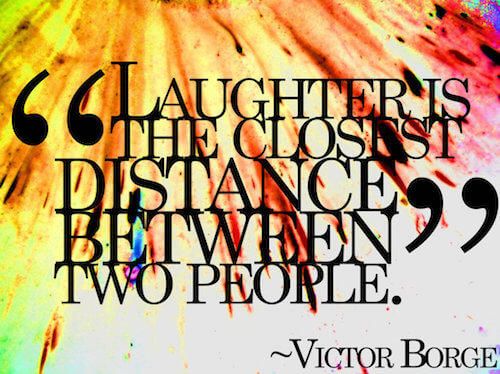Most of us are familiar with the extraordinary book The Anatomy Of An Illness by Norman Cousins (1979). In it he describes the therapeutic benefits of laughter. Cousins had crippling arthritis and was told, pretty much, it was incurable.
Well, it wasn’t! Norman Cousins checked out a whole bunch of old movies (Marx Brothers, Candid Camera Episodes, The Three Stooges, Laurel and Hardy, etc.) and laughed his head off for weeks and months.
The result? His arthritis was cured. He later wrote about his success with this approach and recovery for the New England Journal of Medicine. Doctors studiously ignored his “unscientific” suggestion, of course. They put their faith—to this day—in “treatments” that cure nothing and are in themselves dangerous (opioid deaths have now reached epidemic proportions).
Extending Norman Cousins Idea
Here’s something that goes beyond The Anatomy Of An Illness by Norman Cousins and has therapeutic potential for all of us. The things is, Cousins set himself up with a good reason to laugh: comedy movies.
But what if there is no “reason” to laugh? Well, there is always a reason to laugh, if you look around you! It can be, in itself, a mental weakness to always need a reason to do things. Spontaneity (no reason) is, in itself, an end or reason and can be highly therapeutic for us all!
Try this:
Just stand up and start laughing—WITHOUT ANY REASON AT ALL!
At first you may find it incredibly difficult. We all feel we need a reason to laugh (or do anything else). You don’t.
To do anything without a reason can be soothing and enhancing. It is an ability we need to develop. Otherwise life becomes much too serious.
When you get going and find you can start laughing at will and without a cause, next push yourself to keep laughing! And don’t get serious about it. Don’t try too hard. Forget about laughing authentically. Just laugh!
You will find other changes will take place in your mental landscape, other than just a more joyous sense of humor. You won’t be as stressed or anxious about outcomes; you’ll be able to open up to other points of view; what once seemed a problem will recede; people you couldn’t stand will become tolerable.

Here’s a tip: you’ll find it incredibly easier to do this if you stand in front of a mirror. The bathroom is a good place to start your laughter workshop. If you can’t hack it with laughter at first, just smile! It feels wonderful to have that you-in-the-mirror smiling warmly back at you.
One of my friends who I shared this with remembered an experience from her youth:
Dear Dr. Keith, What a fun idea, thank you! It reminds me of when I was young and my friends and I had a little game of going to a party or a restaurant and starting to ‘group laugh’. If all went to plan, within a short time, nearly everyone around us was either laughing or smiling. On one occasion a waiter came over to our table and said that a gentleman wanted to know what we were laughing about. We said ‘absolutely nothing’ and when the waiter relayed the message the gentleman smiled and gestured us his approval and offered to buy us all a drink! That was our biggest success.
It’s been said before and said often: laughter is infectious. It’s also very therapeutic!
It cleans up unpleasant relationships. You can add this to your mirror routine: mock up the presence of people you hate or have difficulty with. Laugh at them! Laugh long and loud at these people and bring them down to a confrontable presence. If you are a woman who has been slighted and abused by men, laugh at them in the mirror and tell them what fools they were to miss out on a honey like you! (need I say that men can do this too?)
Is Laughter Therapy Backed by Science? Oh Yes!
Whether we giggle, chortle, chuckle, guffaw or “lol” (laughing out loud), everyone laughs. Smiling, a natural part of laughing, is a universal indication of happiness or pleasure across all cultures.
When we smile, the brain releases dopamine, a neurotransmitter that produces feelings of happiness.
Interestingly enough, this effect works both ways: the release of dopamine when we feel happy causes us to smile, and the mere act of smiling causes the brain to release dopamine, which in turn makes us feel happy.
The results of many scientific studies on the effects of laughter have led most experts to agree that laughter can be remarkably therapeutic. For example, laughter and humor have been shown to increase tolerance to pain. Additionally, researchers in Japan have found that laughter lowered blood glucose levels in patients with type 2 diabetes by altering gene expression.
Even more exciting are the findings on the cardiovascular benefits of mirthful laughter. In a recent study by researchers at the University of Maryland, researchers found that endorphins released by the brain in response to laughter cause the production of nitric oxide (NO), which then triggers a number of cardio-protective signaling processes responsible for not only vasodilation but also for reducing platelet aggregation and vascular inflammation.
Laughter therapy furthermore has been shown to have positive effects on the immune system. Professor Lee Berk from Loma Linda University reported that laughter increased the activity of several critical antibodies and natural killer cells, which are essential in anti-tumor defense. These studies represent only a small subset of the scientific literature attesting to the positive benefits of laughter.1

Laughter Therapy for Cancer
For people living with cancer, it may seem strange to find humor when facing such serious issues. Yet, laughter may be helpful in ways you may not have realized or imagined.
Laughter may help you feel better about yourself and the world around you. Laughter may be a natural diversion. When you laugh, no other thought comes to mind. Laughing may also induce physical changes in the body. After laughing for only a few minutes, you may feel better for hours.
When used in addition to conventional cancer treatments, laughter therapy may help in the overall healing process.
Dr. Katherine Puckett, Chief of the Division of Mind-Body Medicine at Cancer Treatment Centers of America®, first introduced laughter therapy at an Illinois hospital upon a patient’s request.
Laughter Club is based not on humor or jokes, but rather on laughter as a physical exercise. One group laughter exercise involves patients standing in a circle, with the leader in the middle. Patients put their fingertips on their cheekbones, chest or lower abdomen and make “ha ha” or “hee hee” sounds until they feel vibrations through their bodies. Dr. Puckett says that, during these exercises, it is hard for people not to join in because laughter is so contagious.
According to Dr. Puckett, at the end of a laughter therapy session, patients have said things like “I didn’t even think about cancer during Laughter Club” and “That felt great! Things have been so hard that we hadn’t laughed in months.”2
P.S. You might also want to check out Marci Schimoff’s book Happy For No Reason (Free Press, New York, 2008).
SOURCES:
1. Can laughter be therapeutic. By Kaitlin McLean. http://www.yalescientific.org/2011/05/can-laughter-be-therapeutic/
2. http://www.cancercenter.com/treatments/laughter-therapy/
